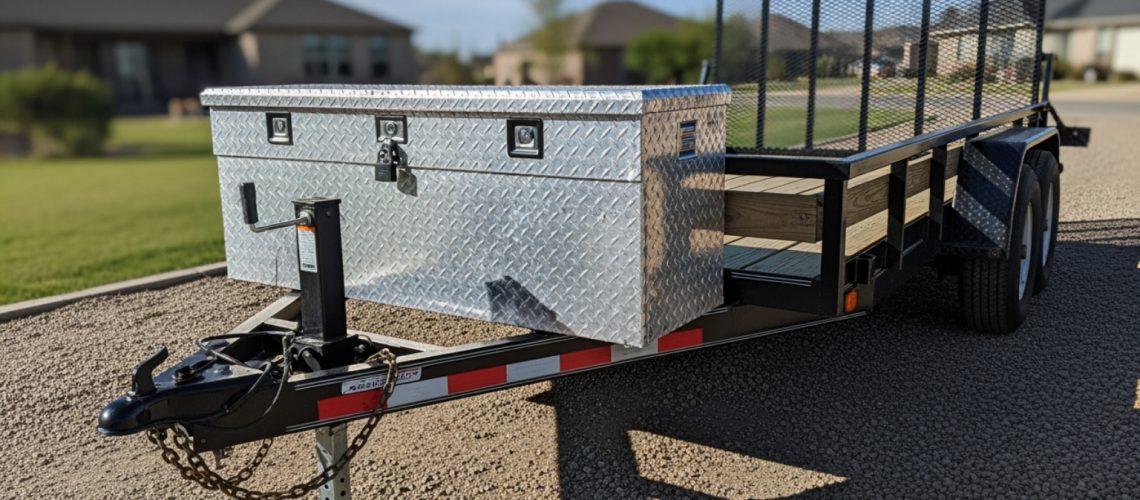Why Secure Storage Matters for Your Trailer
Trailer box storage is a durable, lockable container mounted on a trailer to securely store tools, equipment, and supplies, protecting them from theft and weather damage.
Quick Answer: Best Trailer Box Storage Options
- Aluminum Trailer Tongue Boxes: Lightweight, rust-proof, ideal for utility trailers ($150-$400).
- Steel Underbody Boxes: Maximum security for commercial use ($200-$600+).
- Polymer Side Mount Boxes: Budget-friendly and corrosion-resistant ($100-$250).
- Crossover Tool Boxes: Large capacity for flatbed trailers ($300-$700).
For professionals hauling equipment across South Florida, leaving valuable tools unsecured is not an option. A quality trailer box storage solution keeps your gear organized, protected from coastal humidity and rain, and locked away from theft. The right box transforms unused trailer space into secure, mobile storage, preventing lost or water-damaged equipment.
This guide covers everything you need to know about trailer storage boxes, from the types and materials to the features that ensure durability and security. We’ll also review sizing, installation, and maintenance to help you make a lasting investment. Whether you need a compact tongue box or a heavy-duty underbody unit, understanding your options is key to making the right choice.
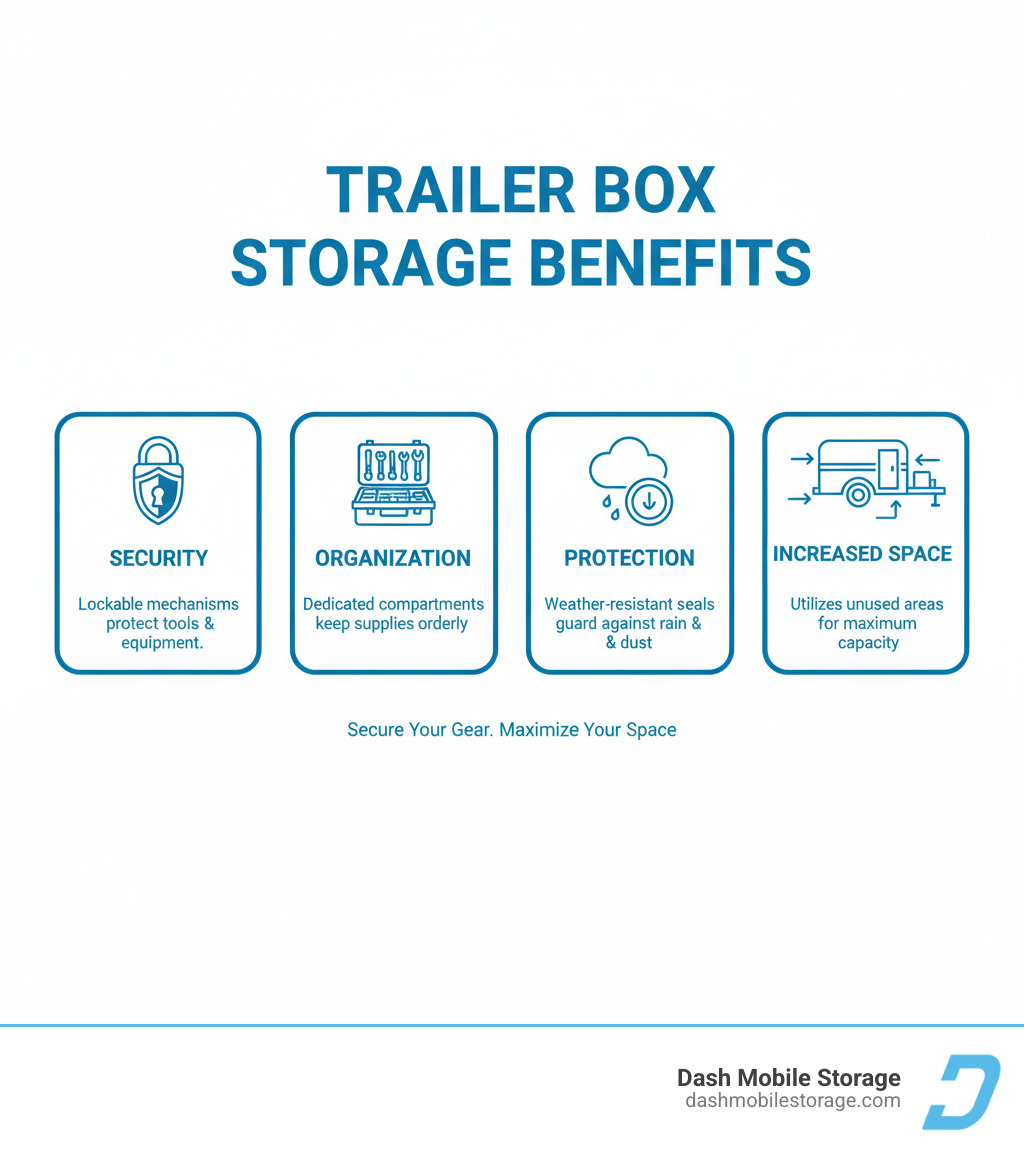
Understanding the Different Types of Trailer Storage Boxes
Not all trailers are built the same, and neither are their storage boxes. When shopping for trailer box storage, you’ll find options designed for different mounting locations and needs. The right choice depends on your trailer type, what you need to store, and how you access your gear. Let’s break down the main types.
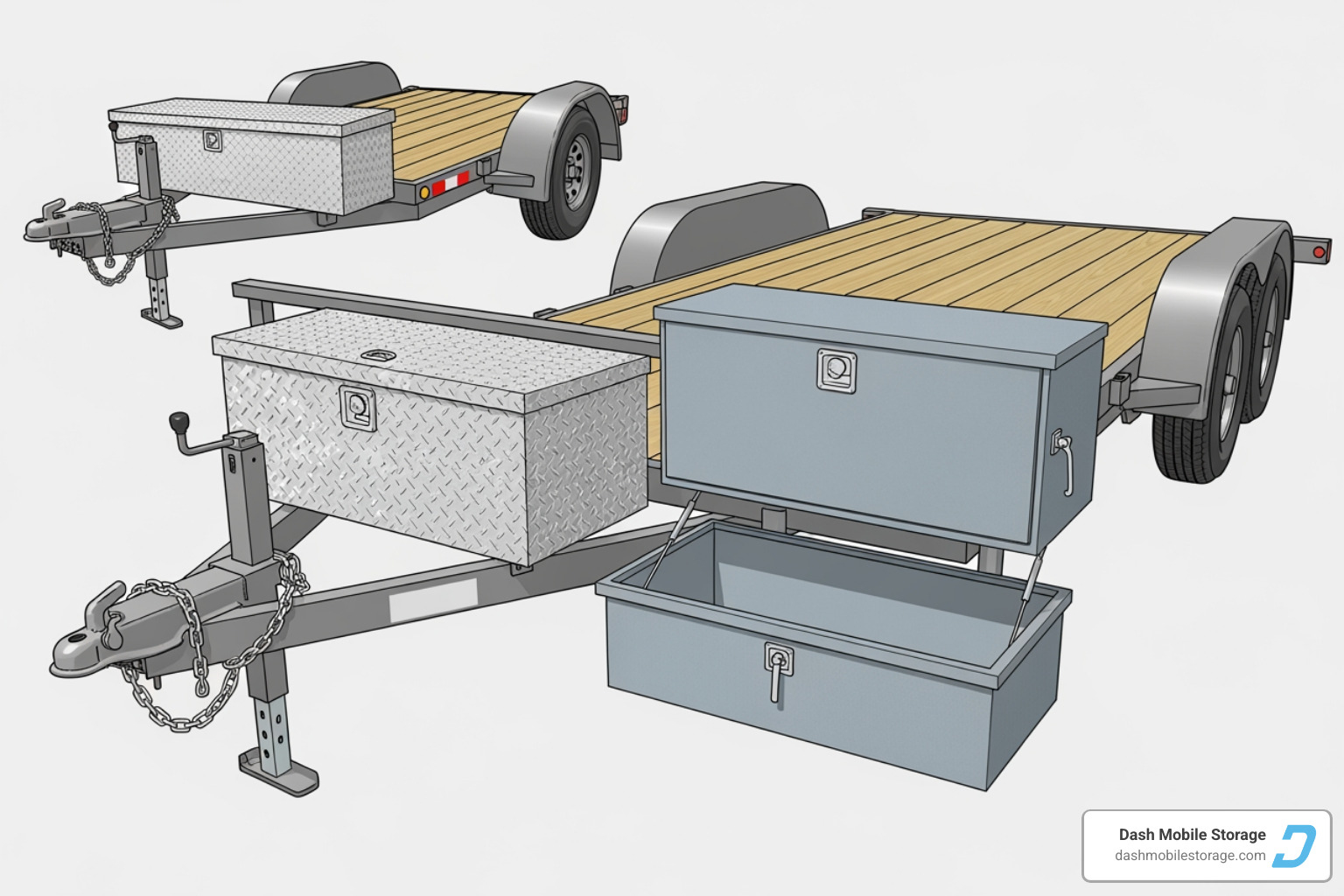
Trailer Tongue Boxes
Tongue boxes are the workhorses of trailer box storage. They are designed to fit on the A-frame or V-shaped tongue at the front of utility trailers, travel trailers, and car haulers. Their popularity comes from turning awkward, unused space into secure, easy-to-reach storage for tie-downs, straps, jacks, and small tools without taking up cargo space.
For example, a compact 2-3/4 cu. ft. steel trailer tongue box is a popular unit that mounts easily and keeps contents dry. For more room and security, larger aluminum models, such as a 48″ extra-wide trailer tongue box, offer weather-tight storage for years of hard use. Their versatility makes them a sensible choice for hauling landscaping equipment or towing a boat.
Underbody and Side Mount Boxes
For serious storage that doesn’t consume bed space, underbody and side mount boxes are ideal. These heavy-duty options bolt directly underneath the trailer or along its side rails.
Underbody boxes mount beneath the trailer bed, making them perfect for commercial trucks and flatbeds where deck space is critical. Construction and landscaping crews use them to carry ample gear without sacrificing room for materials.
Side mount boxes offer quick access from the trailer’s side, ideal for frequently used items like emergency equipment or daily tools. They are available in durable materials like black or stainless steel, built to withstand South Florida’s weather. Both styles are designed for maximum security and stability.
Crossover and Chest Boxes
When you need to store larger items, crossover and chest boxes are the solution. Crossover toolboxes sit across a flatbed trailer’s width on the side rails, offering significant capacity for large power tools and bulky equipment. While common on pickup trucks, larger versions are also great for flatbed trailers.
Chest boxes offer ultimate versatility. These standalone units can be placed anywhere on a flatbed or inside an enclosed trailer. Their large, open compartments make it easy to organize irregularly shaped items or consolidate an entire job site’s worth of tools in one place. For big projects, these types of trailer box storage provide the volume and flexibility needed to stay organized.
Choosing the Right Material: A Durability Showdown
The material of your trailer box storage determines its durability, security, weight, and resistance to South Florida’s humidity. The choice between aluminum, steel, and plastic impacts both quality and your trailer’s handling. Let’s compare.
| Key Factor | Aluminum | Steel | Plastic/Polymer |
|---|---|---|---|
| Weight | Lightweight | Heavy | Lightest |
| Durability | Good strength, dent-resistant | Excellent strength, impact-resistant | Good impact resistance, can crack in cold |
| Security | Very good, hard to cut | Excellent, very hard to breach | Moderate, easier to cut or pry |
| Cost | Mid to High | Mid to High | Low to Mid |
| Rust Resistance | Excellent (naturally rust-proof) | Good (with proper coating), can rust if scratched | Excellent (naturally corrosion-proof) |
Aluminum Boxes
Aluminum offers a great balance of strength and low weight, making it a popular choice for trailer box storage. It’s naturally rust-proof, a crucial feature in coastal humidity. Many aluminum boxes feature a diamond plate texture, which adds rigidity and scratch resistance for a professional look. Premium models use heavy-gauge aluminum and powder paint finishes for improved durability. The lightweight nature of aluminum helps preserve your trailer’s payload capacity and fuel efficiency, a significant benefit for professionals.
Steel Boxes
When maximum security is the priority, steel is the answer. Steel trailer storage boxes are incredibly tough and impact-resistant, making them ideal for protecting expensive equipment. Most steel boxes have a durable powder coat finish for abrasion and corrosion protection. The main trade-off is weight; steel is much heavier than aluminum or plastic, which can affect your trailer’s payload. While the coating protects against rust, any deep scratch exposing the metal must be repaired promptly to prevent corrosion. For job sites requiring top-tier security, the strength of steel often outweighs the extra weight.
Plastic/Polymer Boxes
Plastic or polymer boxes are the lightest option and will never rust, making them a solid, budget-friendly choice. They are also surprisingly dent-resistant and handle rough treatment well. However, their security level is lower than metal. While tough against weather, plastic is more vulnerable to being cut or pried open by a determined thief. We recommend plastic trailer box storage for less valuable items like camping gear or tie-downs, or when minimizing weight is the top priority. They are perfect for situations where you need organization and weather protection for items that are not high-theft targets.
Essential Features to Look for in Your Trailer Box Storage
The specific features of your trailer box storage determine its long-term value and convenience. Based on customer feedback from across South Florida, quality and practical design are paramount. Here’s what to look for.
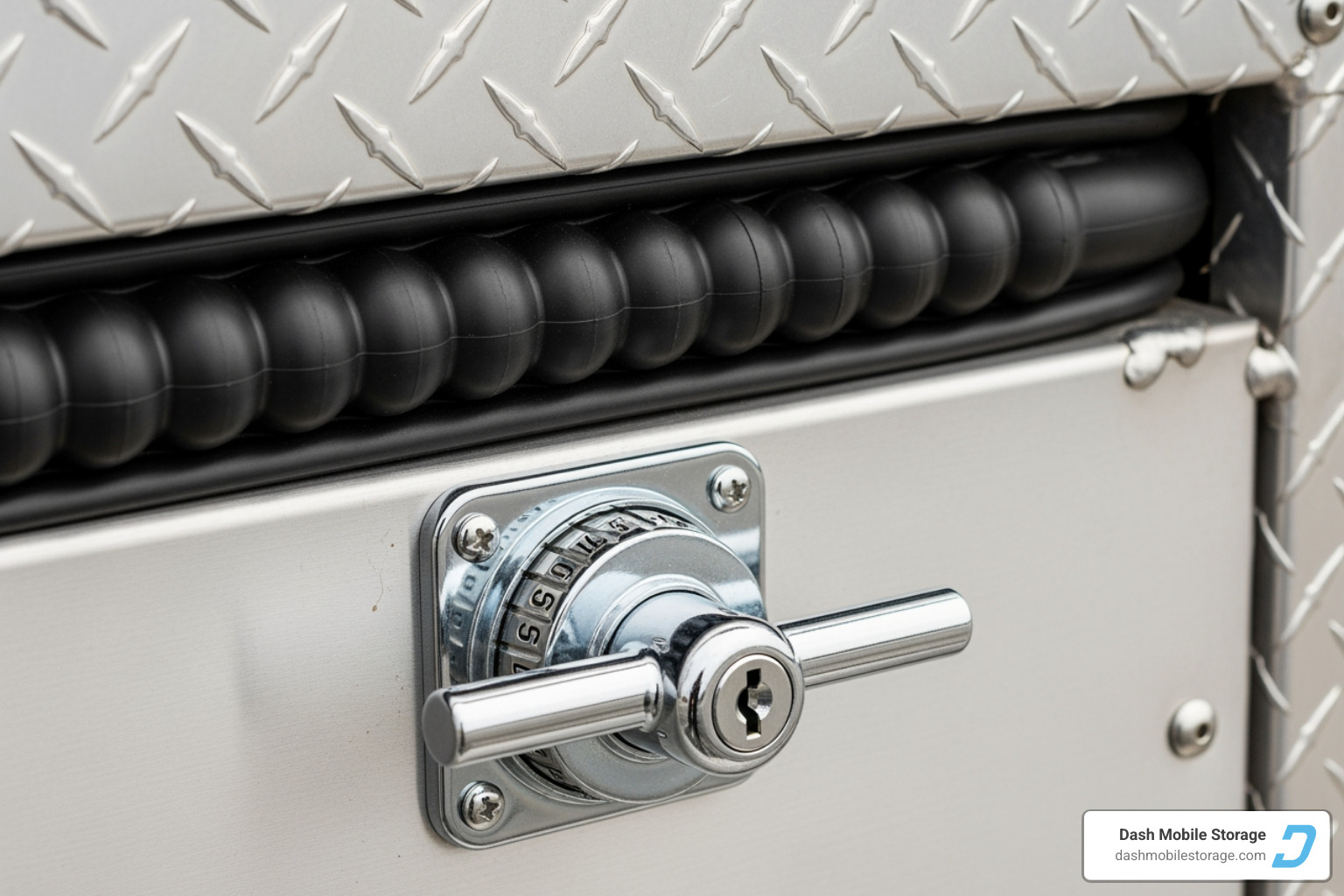
Locking Mechanisms and Security
A solid locking mechanism is your first line of defense against theft. Look for these features:
- Heavy-duty flush mount locking latches, found on many quality boxes, sit flat, making them hard to tamper with and preventing snags.
- Paddle handles offer a secure grip and often incorporate leak-proof stainless steel construction to protect the lock mechanism from moisture.
- Cam locks, paired with heavy-duty hinges, provide a strong engagement that is difficult to defeat.
- Recessed hinges allow the lid to open fully against a wall while protecting the hinge pins from thieves.
Don’t compromise on locks; your expensive tools deserve robust protection.
Weatherproofing and Seals
Florida’s weather demands effective weatherproofing. Your trailer box storage must handle sudden downpours and constant humidity.
- Automotive-grade weather stripping creates a tight seal around the lid. Quality manufacturers use this to seal out moisture and dust.
- Overlapping lid designs are crucial. They cause water to run off the box instead of seeping in, a simple but effective defense against rain.
- Fully welded seams on metal boxes are superior to spot welds. They eliminate gaps for water entry and add structural strength.
Most boxes are water-resistant, not fully waterproof, meaning they handle rain and road spray but are not designed for submersion. Good weatherproofing ensures your gear stays dry and ready for work.
Lid Design and Construction
A well-designed lid makes accessing your gear effortless. Key features include:
- Gas struts, found on many quality models, assist in lifting the lid and hold it open, preventing it from slamming shut. Some designs may limit the lid from opening a full 90 degrees.
- Single lids are common on smaller boxes, while larger chest boxes may have double lids for accessing specific sections without opening the entire box.
- A reinforced lid can double as a temporary workbench, so look for internal bracing or thicker gauge material.
- Hinge quality, especially heavy-duty stainless steel, is critical for longevity. Cheap hinges are often the first point of failure.
Sizing, Installation, and Maintenance Guide
Choosing the right size, installing it correctly, and performing regular maintenance are key to getting the most from your trailer box storage. Rushing these steps can lead to a poor fit or premature wear. Here’s how to get it right.
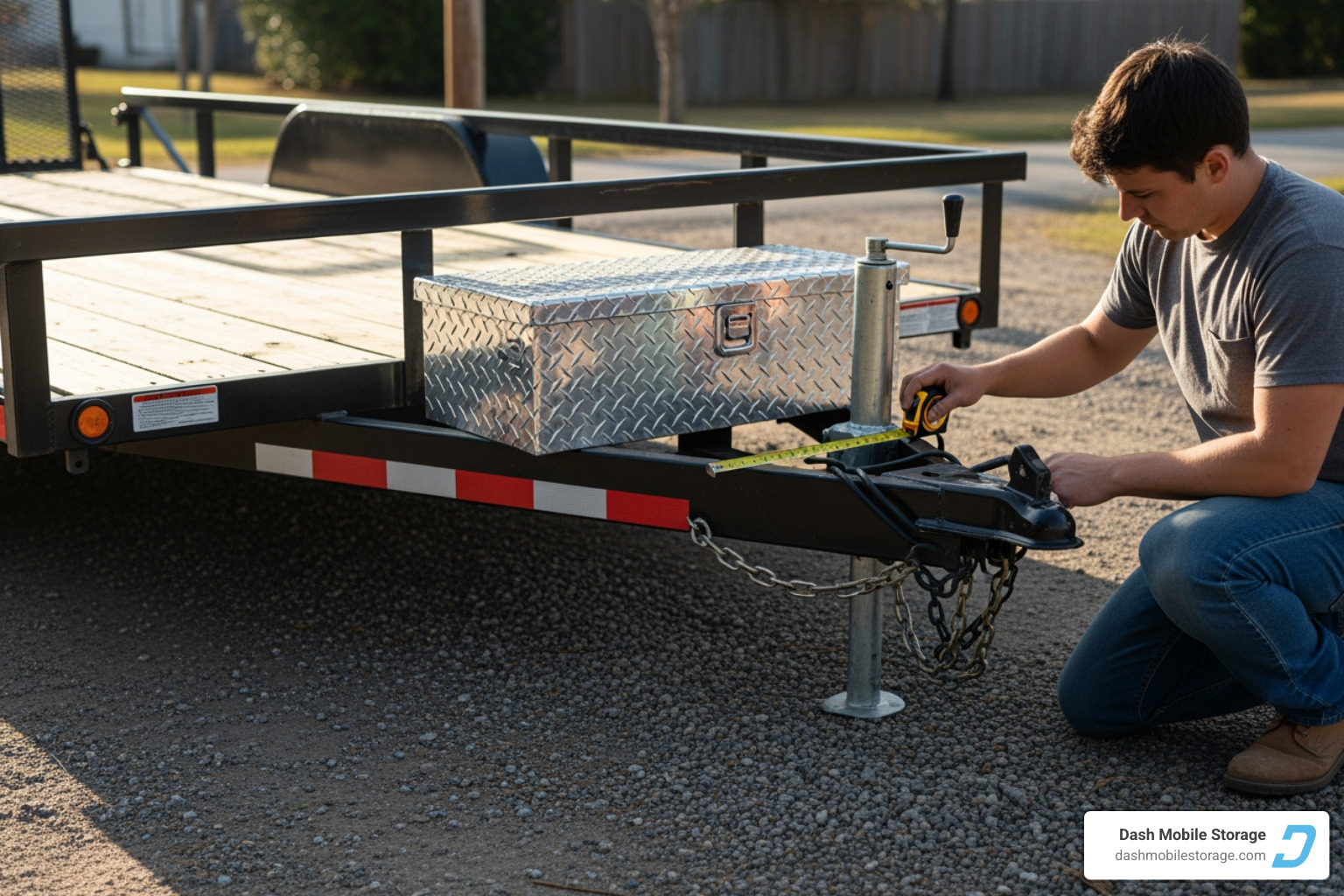
How to Choose the Right Size Trailer Box Storage
Avoid the common mistake of buying a box before measuring. Start by measuring your available trailer space. For tongue boxes, measure the A-frame area, accounting for the coupler and jack. For underbody or side boxes, measure the frame space and check ground clearance.
Next, consider what you’re storing. A small 2-3/4 cu. ft. box is fine for hand tools, but power equipment may require a 48-inch box. Check the dimensions of your largest items. Also, be mindful of weight capacity. A lightweight box can become heavy when loaded, so check both the box’s rating and your trailer’s overall load limit. A few minutes with a tape measure can prevent a costly return.
Proper Installation for Your Trailer Box Storage
Secure mounting is crucial for safety. While often a DIY project, it’s important not to cut corners. Before starting, ensure your trailer is on level ground and chocked. For guidance on trailer safety, consult official resources like NHTSA’s trailer safety tips.
Position the box carefully to ensure it doesn’t interfere with your turning radius or jack operation. Mark your mounting holes, drill pilot holes, and then enlarge them for your hardware. Use quality bolts, washers, and lock nuts. We recommend bolting boxes directly to the trailer for maximum security. If you’re uncertain, professional installation is a worthwhile investment. For larger mobile storage needs, we at Dash Mobile Storage deliver storage units directly to your site. More info about mobile storage solutions
Care and Maintenance for Longevity
Your trailer box storage is exposed to harsh conditions. Regular maintenance will extend its life.
- Wash the box regularly with soap and water to remove road grime and salt.
- Lubricate locks and hinges every few months with a graphite or silicone spray to prevent seizing.
- Check weather seals for cracks or damage and replace them if they are worn.
- For steel boxes, inspect the finish for scratches. Touch up any exposed metal with rust-inhibiting primer and paint to prevent corrosion.
- Check mounting hardware periodically and tighten any loose bolts.
Beyond Tools: Creative Uses and Benefits
Trailer box storage is far more versatile than just a place for tools. Once you have a secure, weatherproof space that travels with you, you’ll find endless uses for it, whether you’re on a Fort Lauderdale job site or heading out on a fishing trip.
Key Benefits of Using a Trailer Box
The value of a quality storage box extends beyond the obvious. Here are the core benefits:
- Improved Security: Durable construction and solid locks protect your valuable equipment from theft.
- Superior Organization: A dedicated space for tools and supplies means you can find what you need in seconds, not minutes.
- Protection from Elements: In South Florida, weatherproofing is essential. A good box keeps rain, dust, and humidity from ruining your gear.
- Maximized Cargo Space: Using the trailer tongue or underbody frees up the main cargo area for larger items.
Common and Creative Uses
Construction crews use these boxes for tools, safety gear, and small parts. For larger job sites needing more space, we also offer conex shipping containers. Learn about large-scale job-site storage
Landscapers keep gardening tools, fuel cans, and trimmer line organized. Outdoor enthusiasts store camping and fishing gear, first-aid kits, and tackle boxes, keeping their vehicle clear.
We highly recommend keeping an emergency roadside kit in your box, including jumper cables, a small compressor, and flares. It’s also the perfect place for ratchet straps and tie-downs. We’ve seen customers use them for everything from animal feed to sports equipment. A well-chosen trailer box storage solution makes life easier. If you need larger-scale mobile storage, Dash Mobile Storage can deliver flexible units to your location. Explore flexible mobile storage units
Frequently Asked Questions about Trailer Boxes
Here are answers to the most common questions we hear from customers across the Treasure Coast and South Florida about trailer box storage.
What is the typical price range for trailer storage boxes?
Price depends on material, size, and features. Steel and aluminum cost more than plastic due to higher material costs and security. Larger boxes with premium features like gas struts and heavy-duty locks are also more expensive.
- Budget models ($100 – $250): Includes smaller plastic and basic steel boxes, good for light-duty use or storing less valuable items.
- Mid-range units ($250 – $600): This is the sweet spot for most users, offering quality aluminum and steel boxes with robust locks and weather sealing that stand up to daily use.
- Premium units ($600+): These are larger, heavy-duty boxes for professionals needing maximum capacity and durability. High-end aluminum models can exceed $1,000.
Finding the right balance between price and quality is key. A durable box that secures your gear is a better long-term investment than one that fails.
Can I install a trailer storage box myself?
Yes, most trailer box storage installations are straightforward DIY projects for those comfortable with basic tools. The process involves measuring, positioning the box, drilling mounting holes, and securing it with bolts. Most boxes include mounting hardware and instructions. You’ll need a drill, wrenches, and a measuring tape. However, if you’re unsure about drilling into your trailer frame or are working with a heavy unit, professional installation is a safe alternative. An improperly installed box can be a road hazard.
Are plastic trailer boxes secure enough?
It depends on what you’re protecting. Plastic boxes are lightweight, rust-proof, and budget-friendly. They resist dents and are ideal for our humid South Florida climate. However, their security against theft is lower than metal. A determined thief can cut or pry open plastic more easily than steel or aluminum. Lock quality is also a major factor. We recommend plastic trailer box storage for items that are not high-theft targets, such as tie-downs, camping gear, or emergency kits. For expensive power tools on a job site in Miami or West Palm Beach, we advise investing in the superior security of a steel or aluminum box.
Conclusion
Choosing the right trailer box storage is straightforward once you understand your options. Whether you select a lightweight aluminum tongue box, a heavy-duty steel underbody unit, or a budget-friendly polymer box, the goal is the same: protecting your investment.
A quality storage box saves you time with better organization and prevents costly damage from theft and weather. It’s about working smarter, whether you’re on a Fort Lauderdale job site or enjoying a weekend on the Treasure Coast. A secure, well-chosen trailer box storage unit provides peace of mind, allowing you to focus on the task at hand.
At Dash Mobile Storage, we are passionate about providing secure and accessible storage solutions across South Florida. While we specialize in larger mobile storage—from job-site containers to cold storage units—we understand that effective storage comes in all sizes. We are committed to bringing quality, reliable service to our community.
Ready to explore larger-scale storage solutions? Our flexible mobile storage units offer the same convenience and security for bigger needs: Explore flexible mobile storage units

